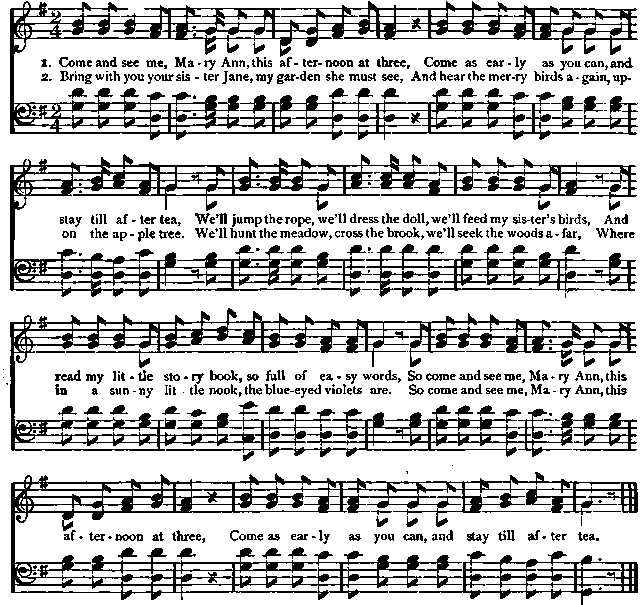Franklin Square Song Collection - online songbook
200 favorite songs and Hymns for Schools, Homes Lyrics & Sheet Music
| Share page | Visit Us On FB |
|
TIO |
FRANKLIN-SQUARE SONG COLLECTION. |
||||
|
Franz Schubert, the great lyrist, was born at Lichtenthal, a suburb of Vienna, in 1797. His father was the schoolmaster of his native village, and according to Mr. Haweis, had eighteen sons and daughters. Franz was the second son, and shared the family passion for music. When he was five years old, his father prepared him for elementary instruction, and at six he was sent to school, where he was always one of the first amongst his fellow students. The old schoolmaster was his son's first instructor in music, as in everything else, the teacher finding that the pupil" had somehow mastered the rudiments for himself." The choir-master, who was Schubert's |
next teacher, observed that " whenever he wanted to teach him anything, he knew it already:" and Salieri, to whom he owed most information, admitted that the boy " was a born genius, and could do whatever he chose." Mr. Haweis, who supplies these particulars in his book, " Music and Morals," argues from this early and extraordinary musical development, similar to that of Mozart and Mendelssohn, that " nature seemed to feel that a career so soon to be closed by untimely death must be begun with the tottering steps and the early lisp of childhood." Butr no doubt, the precocity, with its premature undisciplined independence, had its serious disadvantages; |
||||
|
COME AND SEE ME.
-K |
Childhood Songs. |
||||
|
|
|||||
 |
|||||
|
|
|||||
|
and it is well known that Schubert before he died deeply regretted, and was taking earnest steps to remedy, his defective knowledge of counterpoint and of the higher branches of the study of music. His superficial practical acquaintance with music was made so speedily that, at the age of eleven, he was not only a good singer in the choir of the imperial chapel, but played well on the piano and other musical instruments; and before he was fifteen he was so unexceptionable a violinist, that he would take the part of "first violin" in the orchestral practicings. In 1816, Schubert, then nineteen years of age, wrote what was to prove one of his greatest successes, but which like |
his other successes, received only a gradual acknowledgment. Mr. Haweis has this interesting account of the composition of the now famous air of the " Erl King:" One afternoon, Schubert was alone in the little room alloted to him in his father's house, and happening to take up a volume of Goethe's poems, he read the "Erl King." The rushing sound of the wind, and the terrors of the enchanted forest, were instantly changed for him into realities. Every line of the poem seemed to flow into strange unearthly music as he read, and, seizing a pen, he dashed down the song nearly as it is now sung, in just the time that was necessary for the mechanical writing of the music. |
||||